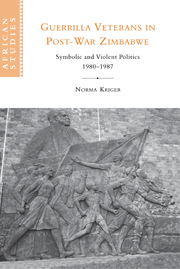Book contents
- Frontmatter
- Contents
- List of tables
- Acknowledgments
- Chronology (1889–1980)
- List of abbreviations
- Map
- 1 Introduction
- 2 The peace settlement
- 3 The assembly phase
- 4 Military integration
- 5 Employment programs for the demobilized
- 6 Conclusion
- Epilogue: the past in the present
- Appendix: The ruling party's attempts to withdraw ex-combatants' special status and ex-combatants' responses, 1988–1997
- Notes
- References
- List of pseudonyms used in the text
- Index
- Cambridge Cultural Social Studies
4 - Military integration
Published online by Cambridge University Press: 22 September 2009
- Frontmatter
- Contents
- List of tables
- Acknowledgments
- Chronology (1889–1980)
- List of abbreviations
- Map
- 1 Introduction
- 2 The peace settlement
- 3 The assembly phase
- 4 Military integration
- 5 Employment programs for the demobilized
- 6 Conclusion
- Epilogue: the past in the present
- Appendix: The ruling party's attempts to withdraw ex-combatants' special status and ex-combatants' responses, 1988–1997
- Notes
- References
- List of pseudonyms used in the text
- Index
- Cambridge Cultural Social Studies
Summary
To build power in the new army, the Zimbabwe National Army (ZNA), the ruling party used the guerrillas. It justified their inclusion in terms of their war contribution and pursued the same strategies as it had toward the assembled guerrillas. Both guerrilla armies were treated as soldiers and military decisions continued to be made jointly by all three armies' representatives on the Joint High Command (JHC). Simultaneously, ZANLA were privileged over ZIPRA guerrillas through protecting ZANLA from merit-based competition with ZIPRA. The strategy of privileging ZANLA over ZIPRA intensified after the end of formal integration in August 1981. Between 1982 and 1987, the ruling party sanctioned and instigated ZANLA violence and other extra-legal means against ZIPRA to secure control of the army. In the first seven years of independence, the British Military Advisory and Training Team (BMATT) was an important accomplice in the ruling party's quest for an army loyal to the party. Whether the guerrillas colluded with or came into conflict with the ruling party and their military leaders, they appealed to their war contributions and often resorted to violence in pursuit of the power and privilege they believed they deserved.
Studies of Zimbabwe's military between 1980 and 1987 evaluate its success in terms of the attainment of an efficient combat-ready conventional force; its cohesion, discipline, and military performance; or its balancing of ethnic domination and military professionalism.
- Type
- Chapter
- Information
- Guerrilla Veterans in Post-war ZimbabweSymbolic and Violent Politics, 1980–1987, pp. 104 - 140Publisher: Cambridge University PressPrint publication year: 2003



